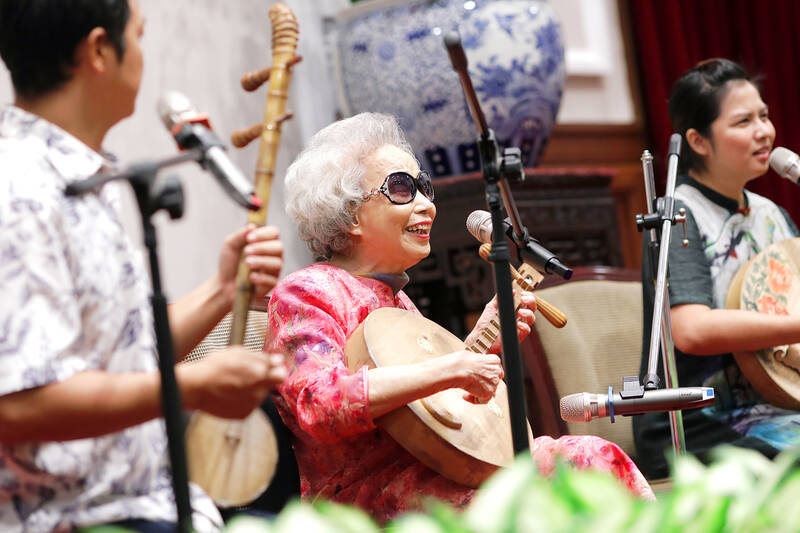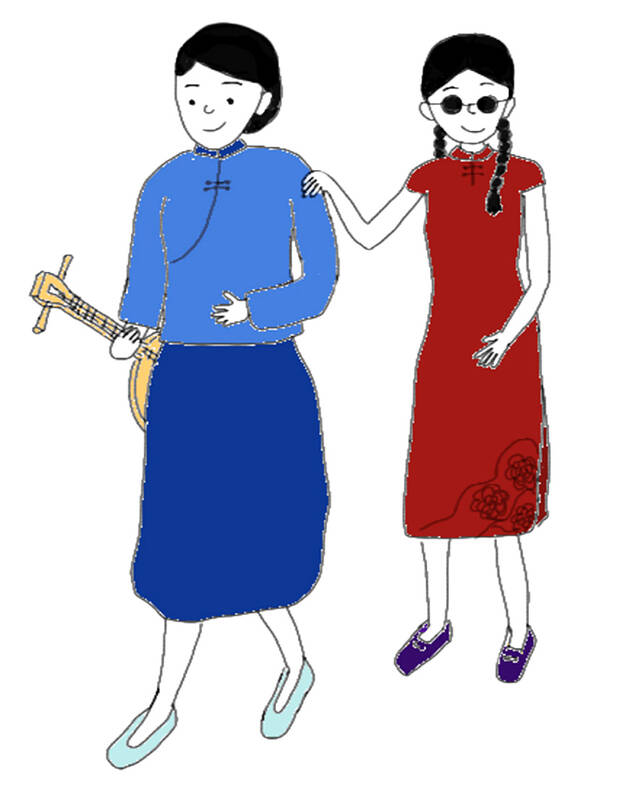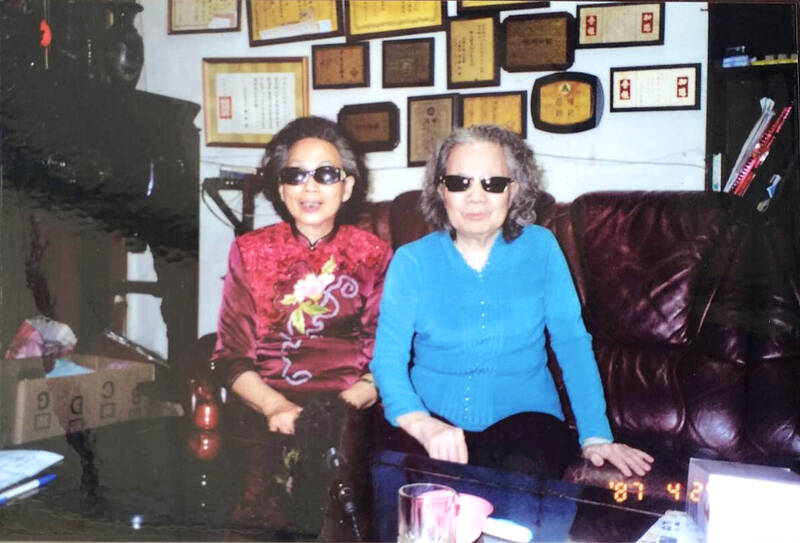During the late 1940s, two blind teenage girls could be seen walking with their moon lutes from Badu (八堵) to Keelung (基隆). Accompanied by a guide, they sometimes trekked more than 10km to Heping Island (和平島), then a bustling commercial hub with many opportunities to perform liam-kua (唸歌), a traditional form of melodic storytelling that mixes singing with the spoken word.
The duo kept singing on the journey home, and were often invited by locals who heard them to perform a set or two. By the time they got home in the wee hours, the nearby ditch that people bathed and washed their laundry in would be relatively clean, and they fetched drinking water for the next day.
The older girl, Hsiao Chin-feng (蕭金鳳), stopped performing after she got married. But the younger one, Yang Hsiu-ching (楊秀卿), carried on for more than seven decades and was revered as a national treasure when she died on June 17 last year at the age of 88.

Photo courtesy of Wikimedia Commons
Yang Hsiu-ching played for most of her career alongside her husband Yang Tsai-hsing (楊再興), a train mechanic who learned how to play the daguangxian (大廣弦, an erhu-like bowed instrument) to take the stage with her during their years traveling the country and using liam-kua performances to peddle medicine and ointments.
Yang Hsiu-ching is known for pioneering the “dialogue” (口白) style of liam-kua, which emphasizes the spoken part through dialogue and dramatic narration, which helped maintain interest in the art form during the 1960s and 1970s when modern or Western forms of entertainment began to gain popularity.
After concluding a successful 20-year radio career in 1989, she continued to perform well into old age. Today, younger people probably recognize Yang Hsiu-ching for her role as narrator in the acclaimed 2017 film The Bold, the Corrupt and the Beautiful (血觀音).

Photo courtesy of Taiwan Cultural Memory Bank
ROUGH BEGINNINGS
Yang was born in 1934 in Quchi (屈尺) in today’s Sindian District, but the family moved to Jiufen (九份) at a young age. She caught a fever at the age of four and, due to delayed treatment, her vision was severely impaired. By the time her stepfather carried her on foot for a whole day to a well known eye doctor in Sansia (三峽), she was already blind.
Becoming a musician was one of the ways for blind people to make a living, and at the age of seven, Yang was given to successful blind liam-kua singer Chiu Feng-ying (邱鳳英) as a foster daughter. She didn’t get along with her new family, and after one particularly intense argument with her foster parents, Yang was sent home.

Photo courtesy of Taiwan Cultural Memory Bank
A few years later, her stepfather saw a woman named Hsiao-Chen A-hsien (蕭陳阿現) performing with a blind young girl at Badu Railway Station. He asked if Hsiao-Chen could take Yang as a disciple, but Hsiao-Chen said the only way was for Yang to become her foster daughter, writes Chen Yi-kai (陳奕愷) in an oral history book about traditional performers.
They lived in an old house without tap water between two railroads, and were mocked by neighbors for drinking from the nearby ditch. Hsiao-Chen’s life was also hard — as a child, she was given to a family as a future daughter-in-law, but her husband abandoned her during World War II and left her to care for two children in addition to his young brother.
Hsiao-Chen did all sorts of odd jobs, working so much that one day she collapsed and could no longer care for the children. While recovering, she supplemented her income by guiding blind liam-kua singers, learning how to perform from watching and practicing on her own. With no close family, raising foster daughters and training them to perform was a way to ensure that someone took care of her in old age.

Photo courtesy of Taiwan Cultural Memory Bank
STRICT TRAINING
Hsiao-Chen was already training another blind foster daughter, Hsiao Chin-feng, when Yang arrived. Hsiao was five or six years older, and patiently taught Yang the basics. The hardest part was memorizing lyrics since the two couldn’t see, and they relied on other people reading the lyrics to them. They only heard the songs once and had little time to practice before they were asked to recite them, and were beaten for any errors.
Besides eating, sleeping and practicing her instrument, Yang recalls that she devoted all her time to memorizing lyrics. She was constantly reciting them, and passersby sometimes thought she had lost her mind. Through this training, she developed an uncanny ability to memorize, improvise and modify lyrics at will.
But she also attributes her memory to a strange event that occurred when she was 14 years old. That year, her leg suddenly swelled up to the point that it required surgery, leaving her with a permanent limp. But after this event, she says her memory became superb and was rarely beaten again.
Yang and Hsiao performed together on the street, at restaurants, banquet halls, tea shops, temple ceremonies and private residences. It was a rare sight as liam-kua was usually a solo act. They sang in unison, took turns and also harmonized, creating a new form of the performance. After Hsiao’s marriage, Yang continued on her own until she turned 18. It was 1951, and many of the establishments they frequented were taken over by refugees of the Chinese Civil War, who couldn’t understand or appreciate liam-kua.
With fewer and fewer opportunities to perform, Yang began working with ointment vendors to help peddle their wares. She would sing a set first to attract an audience, then suddenly stop at a crucial part of the story. The vendor would then appear and start advertising his products, and since the audience were eager to hear the rest of the tale, they stayed and listened. Often they ended up buying from him.
LIFELONG COMPANION
Yang was quite successful and did this for four more years until she met her husband. Yang Tsai-hsing was deeply impressed by Yang Hsiu-ching’s singing, and eventually quit his job to travel with her and help sell ointment. After they had children, they began selling ointment and other medicines themselves, traveling all over the countryside.
One time, a local hoodlum mocked Yang Tsai-hsing for sitting around while his wife performed.
“How about you go learn a bowed instrument so you could accompany her? It’ll probably sound even better,” he said.
Yang Tsai-hsing thought this was a great idea, and a week later he was on stage playing the daguangxian with his wife. They played together for more than 50 years.
The Yangs’ first foray into radio came in 1959, when a Taiwanese opera troupe leader hired them to record liam-kua for a local station. They spent six hours per day recording, then took on other jobs at night. This opportunity only lasted a year.
By the 1960s, Yang Hsiu-ching realized that she needed to modify her act to keep the public’s waning interest in liam-kua. The variations of tunes she could perform were limited, so she decided to elaborate on the spoken part, creating a new form of liam-kua that emphasized storytelling and entertainment value.
The pair stopped traveling for their children’s sake in 1968, and began working full time for various radio stations. It was a new challenge, as they could perform the same tunes in different stops on the road but had to come up with something different every day for the station.
The Yangs retired from radio in 1989. Yang Tsai-hsing died in 2008, but Yang Hsiu-ching was still teaching and playing well into her 80s, regaining fame as society developed a renewed interest in traditional Taiwanese arts. She won the National Culture Award one year before her death in 2021.
Taiwan in Time, a column about Taiwan’s history that is published every Sunday, spotlights important or interesting events around the nation that either have anniversaries this week or are tied to current events.

While Americans face the upcoming second Donald Trump presidency with bright optimism/existential dread in Taiwan there are also varying opinions on what the impact will be here. Regardless of what one thinks of Trump personally and his first administration, US-Taiwan relations blossomed. Relative to the previous Obama administration, arms sales rocketed from US$14 billion during Obama’s eight years to US$18 billion in four years under Trump. High-profile visits by administration officials, bipartisan Congressional delegations, more and higher-level government-to-government direct contacts were all increased under Trump, setting the stage and example for the Biden administration to follow. However, Trump administration secretary

A “meta” detective series in which a struggling Asian waiter becomes the unlikely hero of a police procedural-style criminal conspiracy, Interior Chinatown satirizes Hollywood’s stereotypical treatment of minorities — while also nodding to the progress the industry has belatedly made. The new show, out on Disney-owned Hulu next Tuesday, is based on the critically adored novel by US author Charles Yu (游朝凱), who is of Taiwanese descent. Yu’s 2020 bestseller delivered a humorous takedown of racism in US society through the adventures of Willis Wu, a Hollywood extra reduced to playing roles like “Background Oriental Male” but who dreams of one day

Gabriel Gatehouse only got back from Florida a few minutes ago. His wheeled suitcase is still in the hallway of his London home. He was out there covering the US election for Channel 4 News and has had very little sleep, he says, but you’d never guess it from his twinkle-eyed sprightliness. His original plan was to try to get into Donald Trump’s election party at Mar-a-Lago, he tells me as he makes us each an espresso, but his contact told him to forget it; it was full, “and you don’t blag your way in when the guy’s survived two

Burnt-out love-seekers are shunning dating apps in their millions, but the apps are trying to woo them back with a counter offer: If you don’t want a lover, perhaps you just need a friend? The giants of the industry — Bumble and Match, which owns Tinder — have both created apps catering to friendly meetups, joining countless smaller platforms that have already entered the friend zone. Bumble For Friends launched in July last year and by the third quarter of this year had around 730,000 monthly active users, according to figures from market intelligence firm Sensor Tower. Bumble has also acquired the